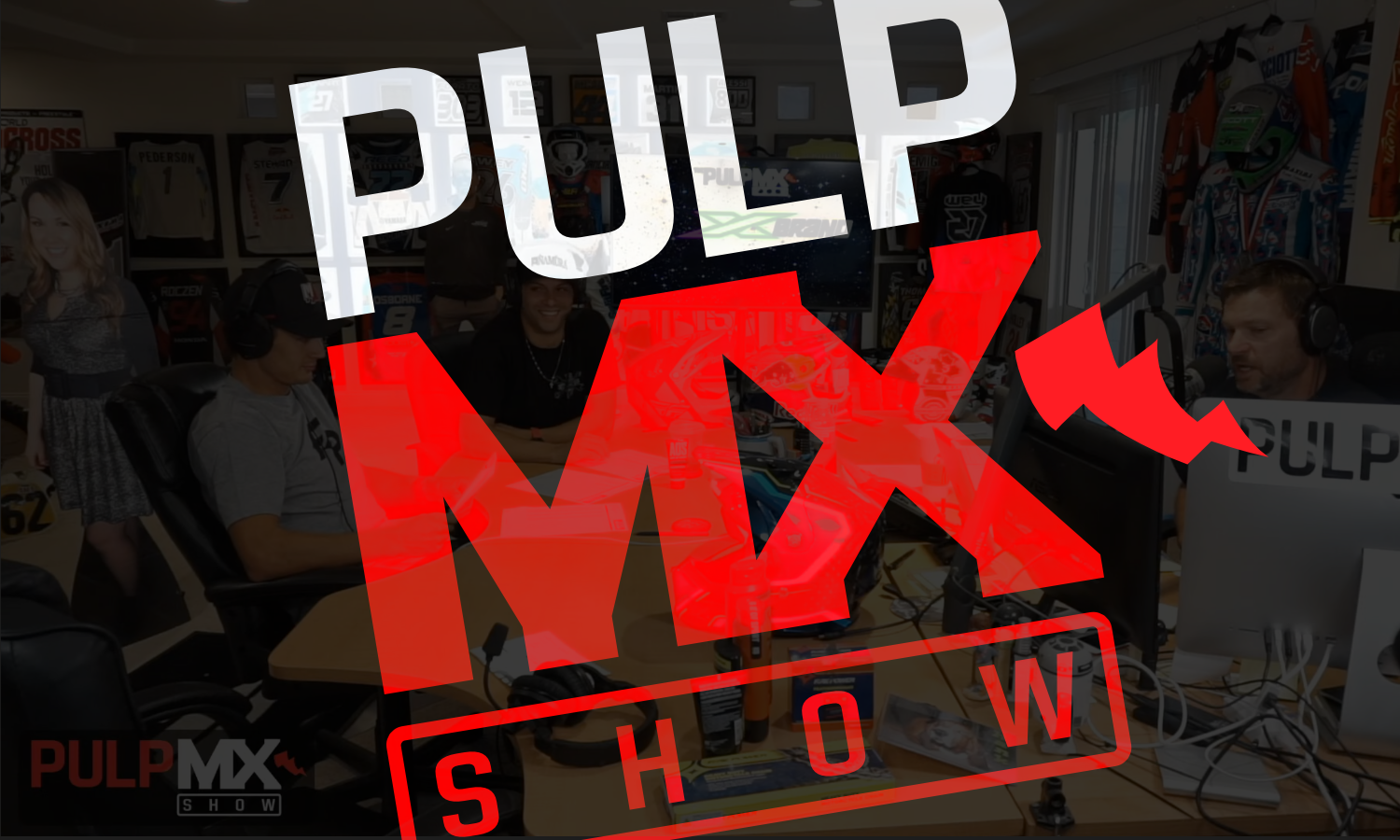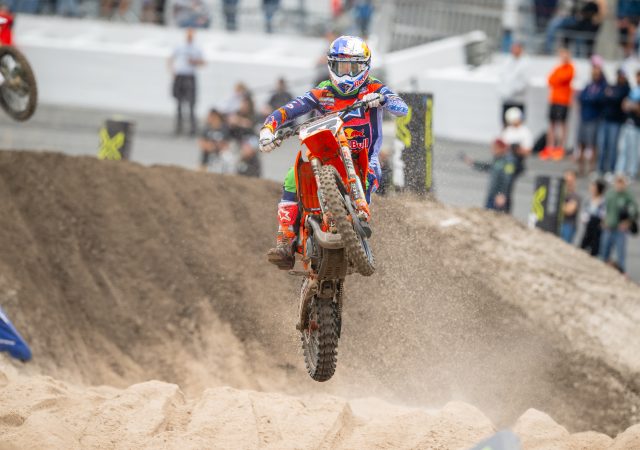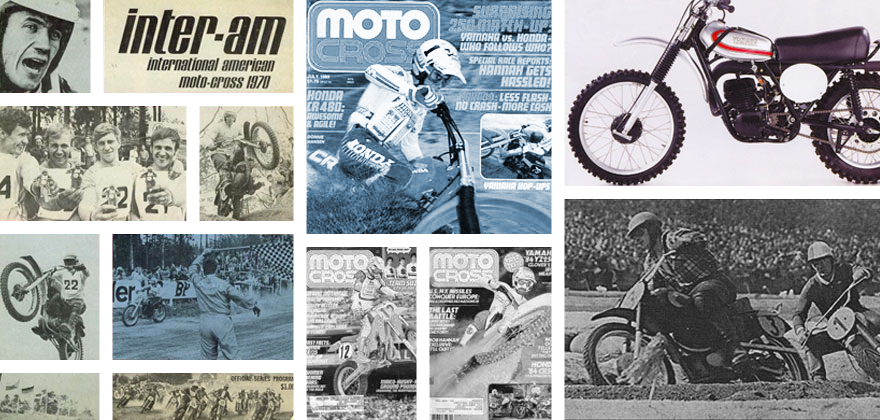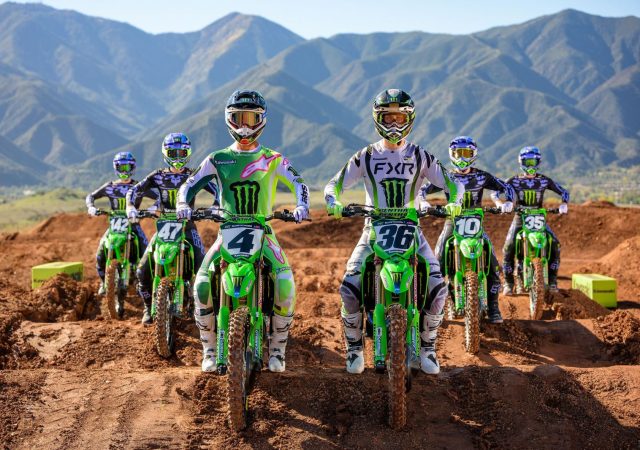AMart, Filthy Phil, a black box van, and the little privateer team that could. (Or couldn’t)
AMart, Filthy Phil, a black box van, and the little privateer team that could. (Or couldn’t)
(Originally I did this story for Racer X Online and because it’s a lot of work, pretty interesting and timeless, like our Moto XXX Oral History, we decided to archive it on the site under the Moto History tab. But here it is for your reading pleasure once again)
Generally speaking, in motocross, longtime veteran riders just don’t get better as the years go on. If you’re a title winner, you’ll be that fast right out of the gate.
This year, though, has been a little different. A couple of guys, good friends at that, have really started to elevate their game. Alex Martin of the CycleTrader.com/Rock River Yamaha team is a seven-year pro who collected his first-ever 250SX podiums this year and won a moto in 250MX. New Yorker Phil Nicoletti is a nine-year pro who won 450SX heat races, made the podium in 450MX races, and is riding better than ever.
It’s one of the cooler stories in the pits, and the fact that they’re friends makes it even better. Training together all these years, Phil and Alex first experienced moto hardship when they were teammates on the privateer Eleven-10 Mods team. This team built fast machines, but the money was never there to properly compete at the top level, which led to some amazing stories of how the squad and the riders tried to keep it all going. We thought taking a little journey down memory lane of life at Eleven-10 with Phil and Alex would be entertaining, and what a comical journey it is.
Also joining us is Nathan Alexander, the former mechanic for Darryn Durham at Eleven-10 and current mechanic for Andrew Short at BTOSports.com KTM, and Billy Hartel, former mechanic for Alex Martin at Eleven-10 and current mechanic for Aaron Plessinger at Yamalube/Star Racing Yamaha.
Sit back, get some cocoa, and settle in for some of the best privateer stories you’ll ever hear.
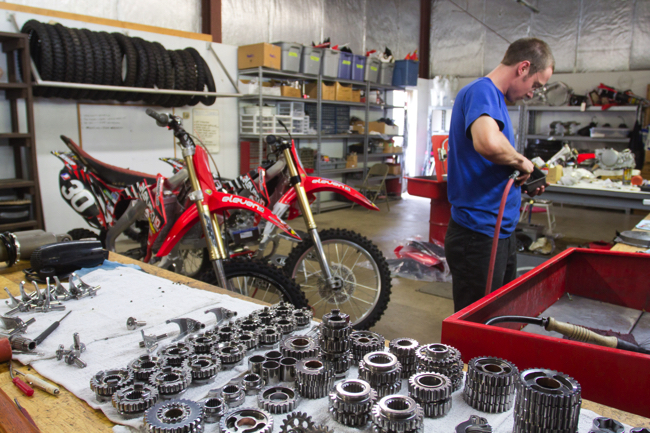 |
Nathan Alexander:I worked for privateer Nathan Skaggs, and Chad Sanner did our engines then. That was when he first started his Eleven-10 business and I met him. Then I was at MTF working for this amateur kid and Levi Kilbarger was there. He was blowing a bunch of money somewhere else on motors, and he just wasn’t getting good-quality stuff. I told him he’s got to get Chad to do his stuff. He actually listened to me and it worked out well. Then I worked for Levi for a while, and then Levi ended up doing this reincarnation of Honda of Troy with Sanner. Then, after that whole thing kind of fell apart, I hung around and Sanner just took me on.
I worked there 2011 and 2012 for Darryn Durham. I was there basically from Alex’s first day there until Darryn’s last. I wasn’t there much with Phil [Nicoletti], but I was around a lot. Phil went there when I was leaving.
Alex Martin:I did the Ti-Lube Honda deal in 2009, just West Coast supercross. They helped me a little bit outdoors, but it was pretty much a privateer effort on the Wonder Warthog thing. In 2010, I was still on the Wonder Warthog program the whole year. I went to Eleven-10 in 2011. I remember hitting up Chad all the time, calling him like, “I can pay for everything—I just want to be on the team.” So I was there in 2011, 2012, and then half of 2013—and 2011 actually went well.
Alexander:The day Alex showed up, it was pissing rain, and I think he expected a lot more. We were working out of a two-car garage. It was so tiny. So he shows up on this rainy, pissy, horrible day, and he’s supposed to stay. Sanner wanted him to stay there for however long, and he ends up in this shit-hole town [in Pennsylvania] that is really bad [and] in this two-car garage. And he’s probably like, What am I getting myself into?
Martin:I love Nate, but he used to be so dirty back in the day. He was living on Sanner’s floor, in his house. He just lived there. Before that, he lived in a tent out at Chad’s house. I remember he was riding a pit bike and he broke his collarbone or something. So he’d be sleeping in this tent with a broken collarbone. It had to be so uncomfortable.
But then he totally graduated up to Sanner’s house! Chad’s wife was letting him stay on the carpet floor in the living room. I swear there’s a subtle stain there to this day in the floor.
Alexander:Yeah, I lived in a tent in Sanner’s yard for a year or so. But during that short time with HoT and Kilbarger, Phil Alderton said it was too cold, and he threw my tent, which was my home, away. He said it was too cold and ripped it all up. So then I was sleeping on the floor at Sanner’s house every once in a while.
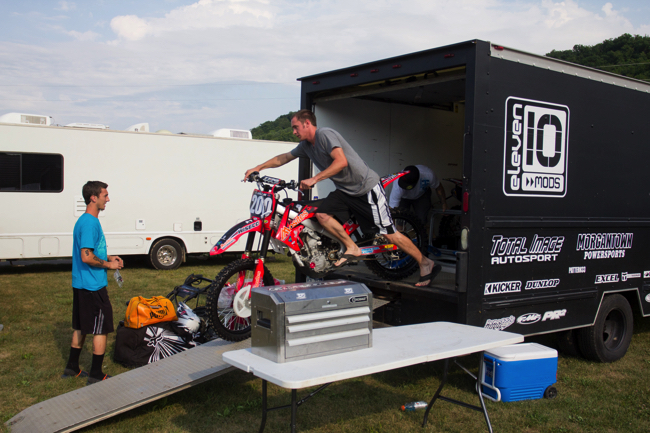 |
The Eleven-10 Mods team had one thing going for it though: It made a return to the old-school ways by pitting out of an all-black box for its entire existence.
Alexander:The van was like brand new when we got it. It was set up, but it wasn’t very comfortable. It just had like a couch/bench thing in it, a TV, and everything. I didn’t actually live in it, but would stay in there quite a bit.
Martin:Back in the day, all of us so were young and dumb. I was like, “Oh, yeah, man, this is sick. Cool, black box van and rims and a stereo system. That’s cool.”
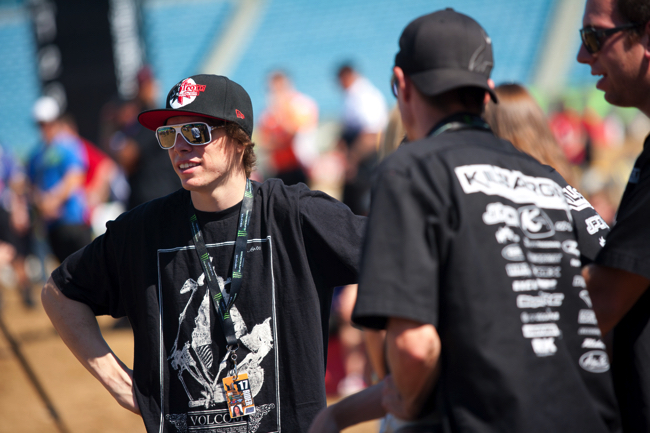 |
Martin also did some West Coast 450SX races in his first year on the team.
Martin:I was kind of paying for pretty much everything on my own. Actually, I’m still surprised to this day that Chad somehow had a guy drive his van out to Anaheim 1. I can’t believe they even did it. That was like the first race I really ever did with them, but just looking back at how hard it was for him to show up at High Point later on, I can’t believe he made it to A1. I think I did three or four rounds on the 450 by myself to start that year.
Alexander:For Anaheim 1, he had bought a 450 and we just redid it for him. Took him to Anaheim just to do a few races or whatever. Very, very last minute right off the bat, and, well, you could tell he was a little sketched out. But he didn’t have anything else. He knew we made an honest effort and tried to help him out, but you can only do so much.
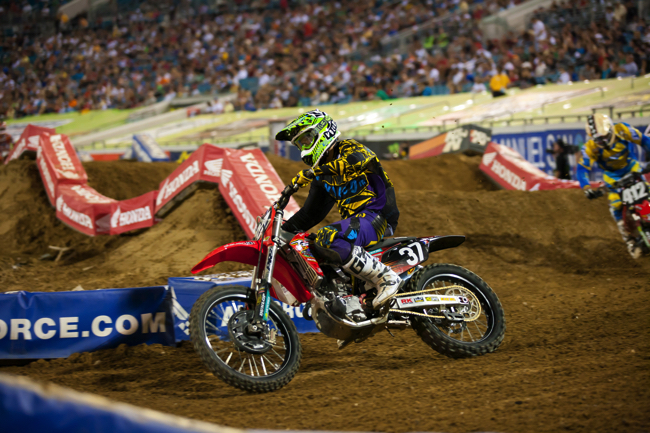 |
Martin:I’d say supercross was a little rocky that first year, crashing in the Jacksonville mechanics’ area probably being a low point.
Alexander:At first, Alex practiced really well. I thought he was going to do really well, and he’d have some flashes of brilliance, but then he’d crash his brains out. I remember the first year in Jacksonville, he just sent it into the mechanics area through the whoops. I don’t think he ever had the chassis [dialed in]. He might have had this rocket ship or whatever that was handed to him, but he didn’t have a chassis that was built for him like all the other guys. But it seemed like he was a pretty good starter. It was just bad luck, I guess.
Martin:Sanner was doing the motors—they were fast—and PR2 was doing the suspension. It was good. He knew what he was doing. Just as far as testing and trying to refine the product, make it a longer spread of power, or [make it] more comfortable, we never did anything like that. It was just kind of dyno it and go and race. You know how riders mentally worry about stuff, so Chad would never tell me until after the race what I had in my bike. I remember in supercross one time, my motor was almost bone stock. It wasn’t very good because I just didn’t have good results yet. When I started getting better results, then he gave me a better motor outdoors. But the race motor that I did have early on in supercross, he gave it to some amateur kid that was going to go race Oak Hill or something like that. So he gave it to the amateur kid and didn’t tell me. And I think I literally had a bone-stock bike at Jacksonville.
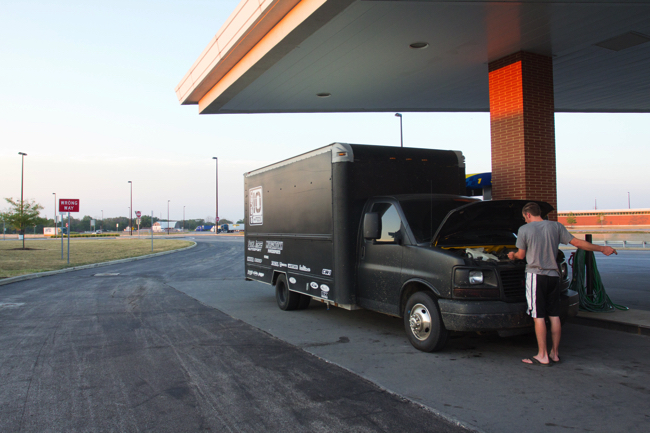 |
Alexander:Alex was flying to the races. One thing Alex is really good at is budgeting. That was the cool thing I learned about Alex. He does things and he does it right. He had everything before the season written out on a piece of paper. So organized. He did everything—flights, hotels, everything. Pretty amazing for a rider.
Martin:I still had help from a doctor friend of mine that was still paying for all my expenses and stuff. It was kind of cheap for me to be on the team. Sanner didn’t have to come up with money to pay for everything.
Alexander:Actually, you know how I said Alex is really, really good at budgeting his money and everything? Well, one thing he wasn’t good at budgeting his money with that year was hiring a mechanic, so he used to have his friends and stuff help him out. Every once in a while he’d have his friend, or he even had Gus from Gus Racing one time just come and push his bike to the starting line. But I had to work on it and get it ready for him. He tried so hard to help sometimes.
One time at the shop, he knew I had a lot going on. His bike needed to be rebuilt to ride the next day. And he goes, “I’ll help.” He’d never even taken them apart, so he doesn’t even take the cam chain tensioner out or anything, and he’s just popping the cam out. He was jacking all kinds of stuff on it. I felt so bad. He was just trying to help.
Martin:I think I was trying to save Chad money, so after Freestone I remember I just drove back to the shop in the van. I didn’t actually drive, but I just went with those guys. It was like twenty hours, I think. I drove back because flights were too expensive, and I don’t think he would have been able to pay for one anyway. Near the end of every series, the money would get tighter. I remember just going to the post office and shipping out a package for him, and he would give me, like, five bucks, and it was thirty-five dollars to ship the package. I was like, all right, I’ll just cover it—no worries.
Alexander:A lot of times, we’d use my money because stuff like us showing up to Budds Creek at the hotel we were supposed to have a reservation at and they said we didn’t have one would happen. It ended up being sold out, so we had to go to another hotel. I actually hadn’t got paid in a long time, but that week was one of the first weeks I got paid. I was thinking that it’s kind of weird for me to get paid all of a sudden. So we got paid and I ended up having to use that money for me and Darryn and those guys’ hotel rooms. So, many times, me and Darryn, we’d show up to the hotel and be like, “Yes, hello, we’re staying at this hotel.” And they’re, like, “No, you don’t have a reservation here.” It got a little old.
Martin:I think around High Point that year, Sanner was pissed about something. I think Durham rode press day and said he hated his bike. “This bike sucks. I like my practice bike better” kind of stuff. So he made Nate switch it over, but before Nate did that Chad came to the shop. He was pissed off at Darryn, and he just kicked the bikes. And they were set up like dominos, so he kicked one over and it knocked all four over! I remember he would just get mad at stuff while working and he would chuck a carburetor through a wall.
Alexander:It was touch and go for us to make Millville that year. For some reason, we were waiting on money from Sanner to go. And then he went home one day to get us money, and he never came back. So we just went ahead and went to Millville. Darryn had a little bit of money and I had some money in my bank account, so we just got money to get to Millville, and we thought we’d worry about the next race in Washougal after we get to Millville. We ended up getting there and Sanner was all cool like nothing happened even though we weren’t supposed to be there! That was weird.
So, after the race, I thought I’ll build Darryn’s bike and do whatever needs done to Alex’s bike at the time, get everything ready, and then we’ll go to Washougal. Well, in the meantime, the van tires were straight-up square. They were like Flintstones tires. I’m not exaggerating. Alex’s dad John was like, “No, you should not drive this thing to Washington. You need tires first. It’s very dangerous.” So Bryar Perry from 180 Decals was with us, and he ended up chipping in some money. Alex had some money leftover on a contingency card, and we got some used tires. So we’re on our way to Washougal and we were freaking out because Sanner wouldn’t answer our phone calls or anything, so we just winged it. And then halfway there, he finally calls us back—this is after a day and a half of driving. He’s says he didn’t want the van to go to Washougal. I said, “You can’t say they’re not racing—the riders were doing so good!” I said I didn’t care what he thought—I’ll use my own money. We’ve got a break after the race, and we can worry about things then.
Martin:When I did the year with Durham, we sort of stayed eighth and tenth in points at the end of the year outdoors, so it was a good season. We had good results all season long. So Chad, he was just motivated. He was excited to go to work every day at that point. It was about 2012 when that started to wear off.
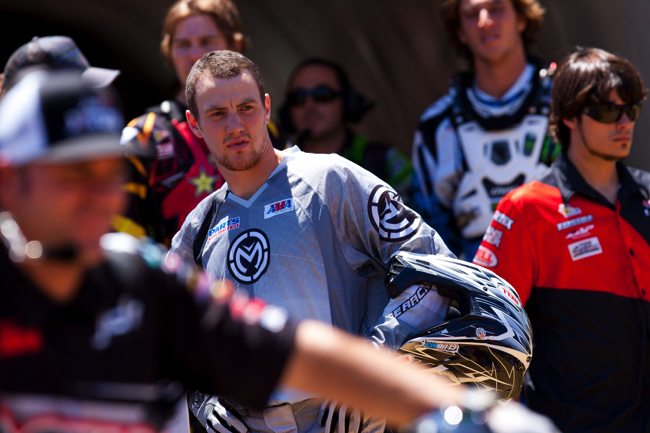 |
Alexander:We got two used tires after Washougal, but it was terrifying before that with the squared tires. You could only go fifty-five miles per hour all the way to Millville because you’d get so fast, and then the thing starts hopping. But Washougal went awesome for us. It was the first time we did really, really well—both guys got in the top ten. Beat all the GEICO Honda guys. It was really cool for us. We were parked right behind them. We were all excited, and then reality sank in and we were like, “How are we supposed to get home?”
Darryn and Alex flew back home, but me and the other mechanic were stuck in the box van. We were hanging out at malls and stuff because we had used all of our money to get there and didn’t have anything. But they ended up wire-transferring us money, but it was $150 at a time, so you can only go so far on $150. We had to stop at another Wal-Mart, and then you’re like, “Okay, well let’s hang out this Wal-Mart parking lot all day waiting for our next $150.” It wasn’t fun.
Martin:Nate and I didn’t become good friends until later in the year. I was still getting to know him, so he was progressively telling me more and more stuff that was happening as it would go on.
Alexander:Alex’s bike was just like the low rodent on the totem pole. They were just giving him whatever. He wouldn’t get what Darryn had. He would get, if anything, Darryn’s used parts.
Honestly, the issue was the finances to actually get to the races. We had plenty of parts for the bikes. We had plenty of business at the shop. The money was coming in. Honestly, none of us knew why we didn’t have the money to get to the races, but we didn’t. But we had plenty of work for the shop. The shop was like all-time best, hammering out work. And it was always the money just to get to the race all year long.
Martin:I had nothing at the end of 2011; that’s why I stayed with the program. The results were good enough. I had some top-fives in there. I was thinking that if I just train a little bit harder and get more time on the bike, I could win. I remember thinking that at the end of 2011, but obviously it didn’t go that way. Then, after a couple years, you definitely start to doubt whether you can do that anymore.
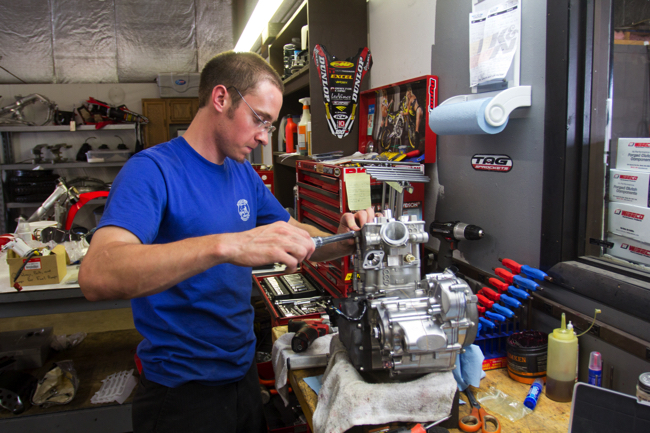 |
Darryn Durham used his successful year on the team to get a ride with the Monster Energy/Pro Circuit Kawasaki team, where he would go on to win the 2012 New Orleans Supercross in the Lites Class. Alexander left the team to go work for Valli Motorsports. Martin stayed on after his ninth in the 250MX series, and the team picked up another wayward privateer named Phil Nicoletti.
Phil Nicoletti:I had just got back from Australia, and I was supposed to go back, but I ended up getting banned—shit hit the fan there [with Visa issues], so I was in a bit of a pinch. All the teams here were filled up. And then I heard there was an opening at Eleven-10 with Alex. But I didn’t even really know Alex at the time.
Martin:I had met Phil at Club MX in 2010, but very briefly. We really didn’t even talk much or hang out. He was riding for Al Albiker’s team for a little bit. It was so funny looking back at it. He was at Club, and I think he was pissed off at the bike and the team, and he went out and did a thirty-five-lap moto on supercross. I can remember thinking, Holy shit, when is this guy going to pull over? That was his last-ditch effort. I’m going to do thirty-five laps on supercross, see if this bike holds up, and if it doesn’t, I’m out. I guess the bike broke and he was, “F**k you, f**k the team,” and leaves. And then sure as shit the next day he’s in Australia!
Nicoletti:I somehow got Sanner’s number, and my doctor friend, Dr. Maresca, got ahold of him and helped me and Chad out a lot with the program. That’s eventually how I kind of got onto the team. Because Chad didn’t have the money to take me on, so Dr. Maresca and his company, St. Lawrence Radiology, paid for my bikes and stuff like that to get me on there. That’s how it all started.
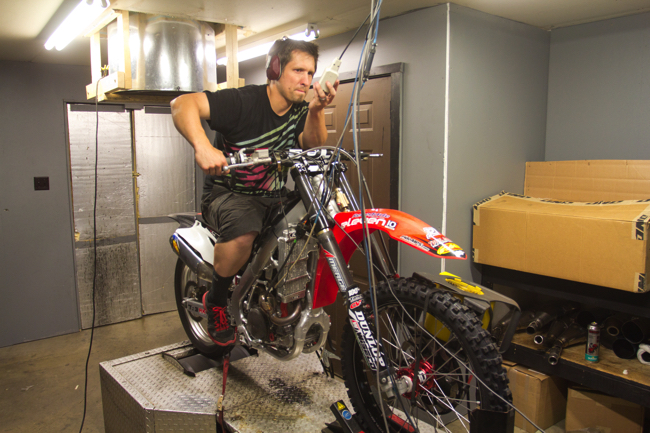 |
Alexander:I wasn’t there much with Phil, but I was still around a lot. Phil went there to replace Darryn. All of us did stay in the shop for a little bit—this spot that was going to be the retail side of Eleven-10—but that never happened. I got a random call from Brad at Star Racing—who were merging with Valli Motorsports offering me a job—but he said I had thirty minutes to decide whether I was going to take it. I took it. I had no money; I needed to make some real money and not rely on Sannner to buy me a slice of pizza every day.
Martin:Actually, honestly, Phil and I slept in that room with Nate for a couple weeks, taking showers with a garden hose because there wasn’t a shower at the shop.
Alexander:You had about a minute to get your shower done before the water turned ice cold.
Nicoletti:There were cobwebs and spider-webs all in this office and just a little cot. It wasn’t the most ideal situation. Then it worked out pretty good because Troll [Alex] made the move with his girlfriend to Uniontown, so every time I went up there, I just stayed at their house. I wasn’t in the shop for too long, maybe a month or so. I slept in a pickup truck my whole amateur career, so the shop was no big deal. I’ve had it a lot worse than that—trust me. But I wasn’t pulling a Nate living in a tent for a year and stuff like that.
Billy Hartel:I got the job working for Eleven-10 in 2012. I started in the winter right about when supercross started. I didn’t start being a mechanic until the outdoor season. A buddy of mine that I grew up with in Pennsylvania, Sanner was helping him out building motors. Chad called me one day and said, “We’re looking for a mechanic down here. What are you doing this summer?”
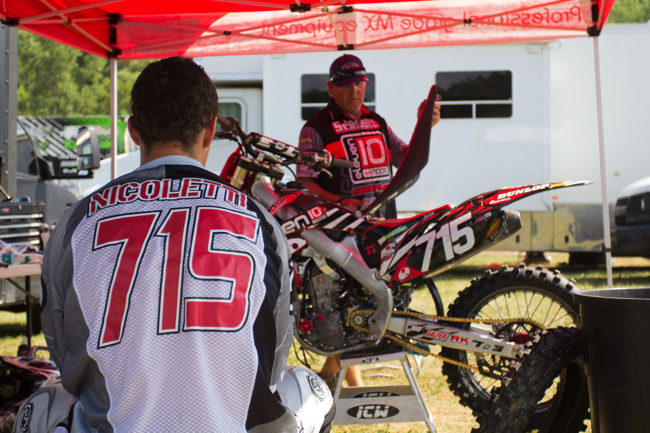 |
Nicoletti:The deal with Eleven-10 happened pretty late. I was only on the bike, a stock Honda, for a month. Chad came down the Wednesday before the opening round of Dallas, and I rode the race bike to feel out the motor. It was really fast because they had a ton of time to make everything right at that time. So I rode it, and I thought, Holy shit, I’m not even going to be able to ride this thing because I’ve been riding a stock Honda, and compared to that thing, it wasn’t even close. My timing, rhythm, everything was off. I went to Dallas, the first round, and somehow I pulled out a fifth in the main. It was a hard-fought fifth. It could have been a fourth, but [Blake] Wharton ended up getting me on the last lap, but it was good.
Martin:There were situations where the mechanics would leave at midnight on Friday night to go to Daytona, and they would barely get there. It was like eighty miles an hour, only stopping for gas, only to get there as the guys are on the track walk—super late stuff.
Nicoletti:But for that first race, it was obviously a struggle to get the box van there on time because it didn’t get there until Saturday morning. I was kind of stressed out with that. For Dallas, we didn’t get our flight information until Friday midday, flew out at 7:30 at night. Meanwhile, we were driving to the airport at five in the afternoon, and the box truck hadn’t even left South Carolina yet to go to Dallas, Texas. And I was thinking that I hope I’m not flying to Dallas for nothing. It’s not even going to make it there. But, sure enough, it made it there by 10:30 a.m. race day. So it all worked out. And then to get a fifth was all right.
Alexander:I think Phil became their guinea pig. They just gave him the hot-rod bike that they don’t know if it was going to make it, and they thought they’d just do some testing with him at the races. I remember one time, when I was working for Star Yamaha, going over to check on him at Indy, and there’s something wrong with his bike and he was pretty pissed. They were telling me what the bike was doing, and I knew what was wrong. And they took it apart, and they said they didn’t have the parts for it. I was working for Star and going around on different teams getting parts for them to get their bike good to go again.
Nicoletti:It went south real quick. After Dallas, at Atlanta, everything was a mad scramble. The box truck showed up late. We barely made it through tech, and I just went out there ripping my bike, and honestly, I don’t even think my shroud bolts were in. Sure enough, I wasn’t even half a lap [into practice] and my fuel line was off. The bike just cut off on the face of a triple, and I was rolling the windows up thirty feet in the air.
I banged up my knee really bad. It was swollen. It was the size of a freaking watermelon. I didn’t race. And then the next few weeks were bad. Bikes blowing up—the whole nine yards. I think that year, out of seven rounds, I got two fifths and a tenth, which were all the races that I finished.
In the 2012 Monster Energy Supercross season, Nicoletti went 5-DNF-DNF-5-10.
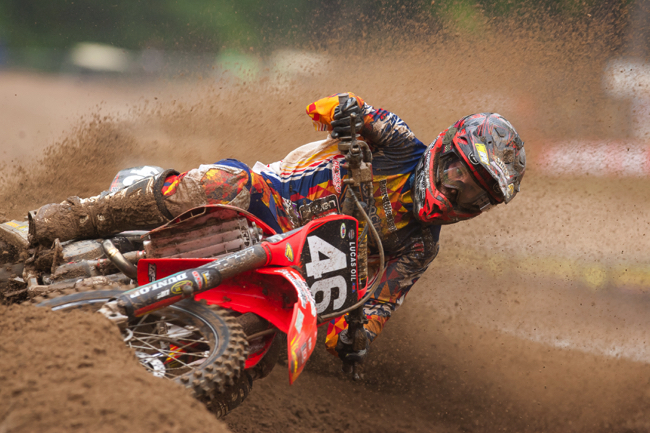 |
Nicoletti:We were DNF’ing a lot of races because, I think, we were frying condensers and we didn’t know why. The bikes were just shutting off mid-race or mid-practice. Actually, one race—I believe it was Indianapolis—I didn’t ride because we didn’t know why we were frying condensers. I’m not sure if they were condensers or the regulators or whatever.
Martin:I don’t know why, but a lot of DNFs and stuff—it seemed like it all happened to Phil. I got lucky. I think I had maybe two DNFs in 2011. They were all motor related.
Nicoletti:Chad was really scrambling trying to figure out what it was. I believe Dan Betley at Honda helped him out at Indy and finally got it sorted out. But it was hard because I had already been so spooked because it had shut off on me one time during the day at Indy, and I was just like, “Golly, I can’t go through this again.” A cat’s only got nine lives, and I’ve used up nineteen already. Twenty is going to be the end of the road.
Martin:Honestly, I didn’t know Phil as well as I do now, so maybe he wasn’t as comfortable with me, but he was way less disgruntled back then. But I felt really bad for Phil. It was unbelievable. In supercross, it was to the point where he was afraid to ride the bike. He wouldn’t jump a ten-foot jump because [he thought] it was going to blow up. It was scary. I don’t blame him, but honestly I just couldn’t understand why the thing blew up every time.
With supercross out of the way (Nicoletti was twenty-sixth in the points, Martin was fourteenth), the team focused on outdoors and hoped to repeat the previous year’s results with a new mechanic for Martin.
Hartel:When I first started there, things were great and I was happy. We had just hired another guy, too, so it was a couple of fresh guys in there. Sanner was really motivated at that point in time. Things were going good. I just did a lot of customer stuff mostly, and we were kind of rotating in and out and going on the road for the races. And then the other guy just decided he didn’t want to do that anymore, and I started wrenching full-time for Alex.
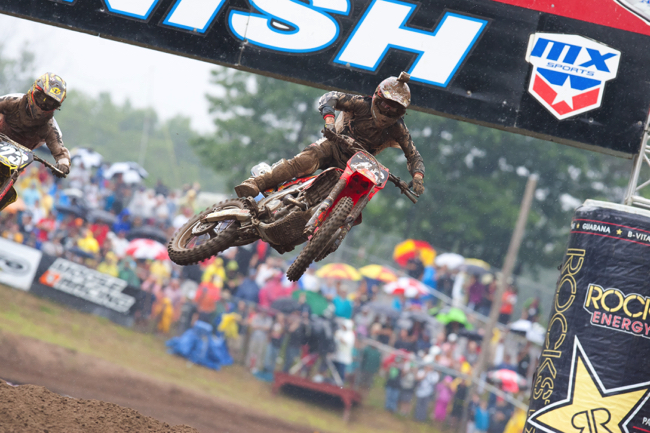 |
Nicoletti:High Point was Eleven-10’s home race. They’re half an hour away, and that was the most chaotic the shop had ever been. TV reporters were there doing interviews with us and this and that. Everybody’s pretty pumped up about the deal, and the box van never went to the track on Friday. The guys said to not worry about it. I had talked to Chad and had texted him before I went to sleep at night to make sure the box truck will be there, because Toolie, the AMA tech inspection guy, he told us the bike needs to be through tech at 6:30 Saturday morning. I’m thinking, there’s no way they’re going to be on the road at 4:45, and you you need to leave that early to get down there, get unloaded, the whole nine, because I was sure they’re going to be up all night just getting everything ready.
Alexander:We had a big problem making tech inspection on Fridays. You usually had to do it the next morning of the race. The AMA would be so pissed. You know how it is in the morning on race day. There were a few times they just made us wait it out almost until practice started; then they would let us tech.
Hartel:He [Sanner] would give us a card for gas, and that was another reason why we never left until so late, because last minute he would all of a sudden say we got to put customer stuff together so we can get paid to be able to go to the races and just be able to afford the gas money to get there.
Tim McAdams (AMA Tech Inspector):I don’t even know how many times they were late for tech inspection. It got to be pretty ridiculous—and over multiple years. It was constant. I was always that saying your dad would use, “No, this is it. You need to be here now. It’s getting old,” and then I would let them be late anyway.
Nicoletti:So, High Point, Chad and the mechanic said, “Yeah, we’ll be there, no worries.” Well, sure enough, I show up at the track at eight and there was no box truck. I went to Toolie [McAdams] and asked him what was up, and right then the box truck finally comes rocking up at 8:15, and Toolie goes, “No, we gave you enough chances.” Which, in the AMA’s defense, they had up until that point. You can only pull so many strings to try and pamper the situation.
Alexander:High Point’s, like, twenty minutes away. We were late there when I worked there. Then those guys didn’t even get to race the next year. Thirty minutes away and can’t make it.
Tolleson:The main thing is, if they would tell us early instead of waiting until the last second to tell us, it’s not so bad. But then it was like every weekend, and that’s just what was getting old. They couldn’t do it every weekend. Finally, at High Point, we had enough and didn’t let them race.
Hartel:It got to a point where things were kind of unmotivated around the shop, so nothing really got done until last minute. We always basically calculated that if tech closes at five and it takes thirteen hours to get there, we’re going to leave thirteen hours before tech closes to get to the race. Whether stuff was done or not didn’t matter—“Oh, well, throw it in the truck and we’re going to try and make it.” Half the time we never made it on time anyway.
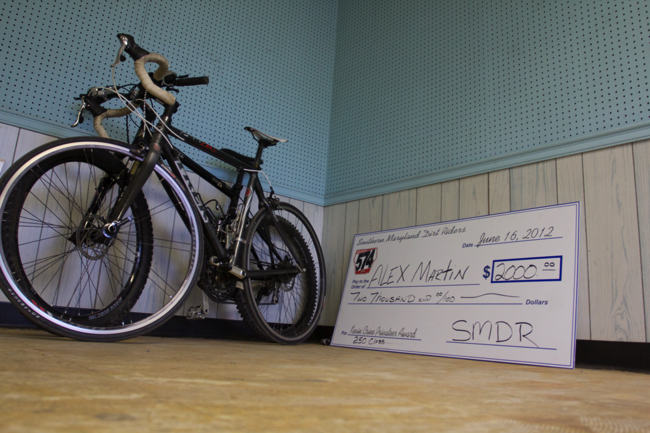 |
Nicoletti:But the bikes were really good at times. It was all depending on if there was the right amount of money at the bank account at the time—if the timing was right. All the stars had to be in line for the bikes to run really good and finish the day because we had plenty of bikes that ran good, but just didn’t finish the day. It’s hard to say that they were ticking time bombs, but with our sport and the way it is—it revolves around money—it takes money to run a sufficient program, just like anything else. Obviously this is something that Eleven-10 or any small company that’s running out of a black box van struggles with.
Hartel:Sanner definitely knows how to build a bike. He could build a motor, and he could build something really fast. If he had everything working right, those guys could get some good results.
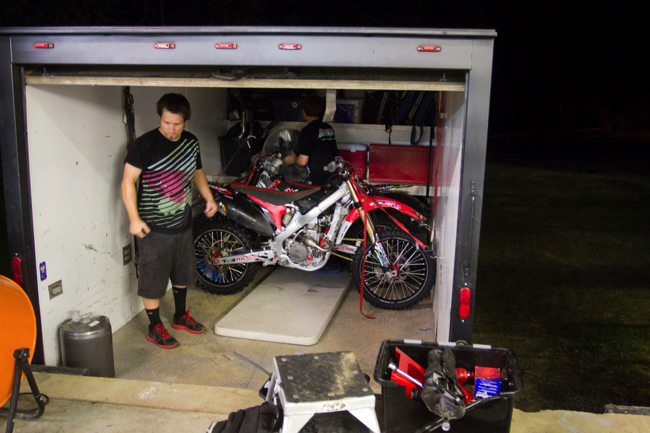 |
Nicoletti:Budds Creek that year was the first top-ten overall. I think I went 13-9. We went through a few motors that day. I think Troll got eleventh in the second moto, but in practice he blew a motor up. Then, second moto, I had three laps to go, and my bike’s pinging and it’s just hanging on. I knew that something’s going to happen. I’m not going to make it. But it finishes! So I ride it back to the pits on that pavement road there, and boom, there she blows! And I just coasted it right to the box truck. I’m sitting there still sweating, and Troll’s rolling up to the van behind me, and then his grenades! So that right there was three motors in one day because one had went in practice. But let me tell you, the bikes that day were as fast as they had ever been.
Hartel:In your head you’re thinking, I hope these guys don’t really think this is my fault! I’m doing everything I possibly can for these guys to make the race. I just didn’t know what else to do. I can’t do anything to help these motor problems.
Nicoletti:After Budds, we were back in Uniontown, and the box truck couldn’t go to RedBud because there wasn’t enough money on the credit card. So Troll and I drove ten hours to RedBud in Troll’s van, packed very tight. We had two bare frames, no motors in them, no graphics, or anything, and Alex and I just went with Billy. We showed up at RedBud, teched our bikes with no motors. I’m serious. That’s how cool the AMA was. I had duct-tape numbers because that’s all I had.
Hartel:I think there was something going on with the box van before RedBud, and Phil just said, “That’s it. Just load our shit up in this van; we’re leaving right now.” And I said, “Okay.” So we headed to RedBud.
 |
Nicoletti:Saturday morning, Alex did one lap in practice, blew his bike up, and he just sat there. He spent all the money, and I’m betting he probably didn’t get reimbursed for it. There’s no way.
Martin:That was definitely the lowest point for me.
Nicoletti:So RedBud was just tough. For whatever reason, my motor was slow, and it was like one of those weekends. It was a dog. We didn’t have parts to put clutches in it. It was just terrible. For me, I flew out to ride a Star bike after that race because Gareth Swanepoel was hurt. I was really considering taking that deal, but that was the year they merged with Valli and it was a bit of a disaster also, so I didn’t do it.
I wasn’t going to leave one cluster to go to another cluster that might be more functional, but I kept thinking everything was going to work out and be okay, and giving everything the benefit of the doubt. Like I said, the highs were highs, and I kept sticking with that theory for once in my life.
Hartel:There was one race—I think it was Millville—Phil’s mechanic at the time got to his layover, and at the airport, he decided he wasn’t going the rest of the way. So I had to wrench for Alex and Phil at the same time, and that was pretty tough. Whenever that kind of stuff would happen, we were just like, seriously, what are we doing? This is insane.
Nicoletti:I had to swap a motor between motos and everything!
Hartel:I loved working for Alex. He’s always a good time and very positive. He’s probably one of the hardest working guys I’ve ever seen, maybe aside from his brother.
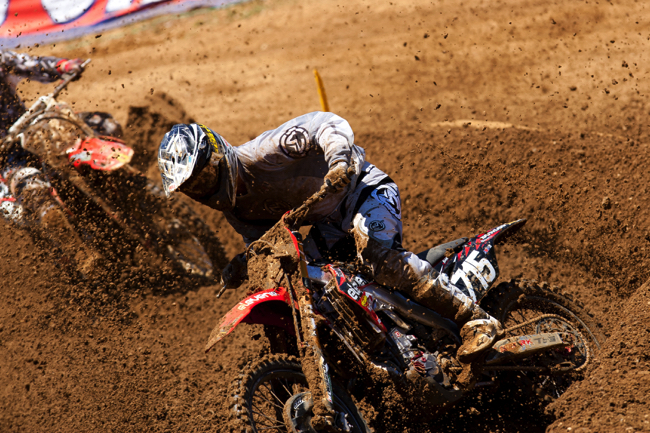 |
Every once in a while, the riders and mechanics would have enough and call together a meeting with the personnel.
Nicoletti:We had a lot of heart to hearts, me, Chad, Alex, and other guys on the team. And when we left the meetings, everyone was just like pumped up. Like, “Yeah, all right, now it’s time.” Then, the next day, it’s just like, “Well, what the hell was yesterday about?” So that was hard, but it just came down to money management. That part sucked.
Martin:There were just some races where I missed altogether with motor issues. I can remember coming back to the shop and saying let’s have a meeting—we need to sit down and figure out do you want to keep doing this, or do you want to just throw in the towel? And I’ll give Chad credit—he never did really throw in the towel, but at the same time it might have been easier if he just had because he was just dragging along at like a 50 percent effort.
Hartel:Phil pretty much hit the nail on the head with that. We would sit down on a Monday; Phil would be so fired up and so pissed off just because nothing can ever go right for him. And Alex as well—he was pretty mad too. And I’m actually a pretty hard guy to get really mad at you. I’m pretty easy going. And we would be all fired up and we’d go in there and talk about it. And one thing about Sanner is he can sell you the dream like nobody’s business. And he’ll do it to you one hundred times and you believe him every single time. Somehow he makes you believe it. But things would be good for about a week or a day or two, and then that’s it.
Hartel oftentimes had the very raw end of the stick and had to make the best out of some sad times.
Hartel:Worst road trip I had was Hangtown. So, up until the day before I had to leave, it was looking like I was going to be the only guy to drive the van all the way there. It was pretty much one of those trips where we didn’t have the time to stop. We had to go the whole time. And then, last minute, we found a guy that decided he would jump in and drive too. So then we drove to California from Pennsylvania, and we get to the hotel we’re supposed to be at and waiting for a credit card authorization form at the hotel that never happened. So we slept in the lobby of the hotel while we were racing and all that.
I would come in and say, “Did you guys get that credit authorization form yet?” And by that time, we were so tired I was like, I’m just going to sit on the couch and wait for it and then I just fell asleep. They never said anything!
Finally, near the end of the Nationals Phil had decided that he had enough of the team and was going to race a privateer 450.
Nicoletti:Chad was going to let me race a 450, but he backed out of that deal at the last minute, and that’s when I went out on my own for the last three or four. I rode a 2011 Honda a buddy let me use. It was a year-old bike. It was kind of older, but actually that’s how I kind of came in contact with JGR. They built my motor and did my own deal.
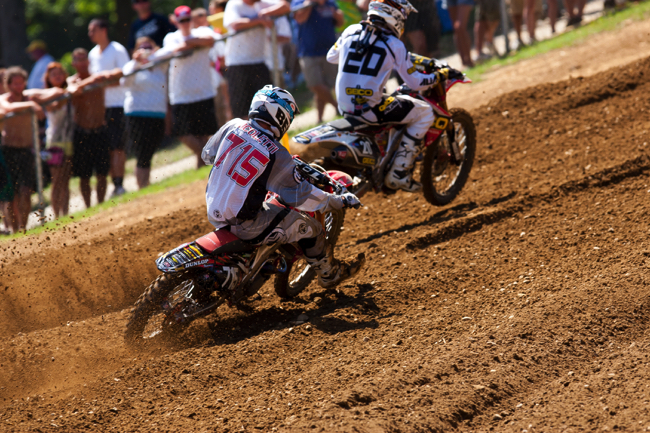 |
Incredibly, Eleven-10 Mods got Yamaha support for 2013, and it looked like things would be better, as the team kept Martin and added Brady Kiesel. Despite the improved support, things were getting worse, and at the beginning of outdoors, with bikes blowing up and the bills mounting, Yamaha stepped in and found a home for Martin and Hartel.
Hartel:When that [Yamaha support] came about, I got really excited. I thought, This is exactly what Sanner needed. He just needed a little bit of help and support. I thought that would give him all the motivation in the world and everything he needed to come on top of everything. And at first he was good, and then it started getting back to the old ways pretty quickly.
Martin: I think he [Sanner] didn’t have enough money. I think he was just really over it. He just didn’t care anymore to take us to the races. I think I was a little frustrated because my race bike wasn’t that good. He just couldn’t make the Yamaha fast at that point in time. There was some stuff that he was trying with the carburetors. It didn’t work. The bike ran like crap.
Hartel:It was actually the High Point round where it all ended. We raced that day, and then that was the end of it. Yamaha basically said, “That’s it. We’ve kind of had enough of this.” They said that bike needs to go to Rock River, and Alex is going to ride out of their tent. So Christina [Denny, CycleTrader.com/Rock River team manager] and all them took us in and let him do that. Alex brought me along with him, and things started looking up a bit.
With a solid program and less worries, Martin started to get better and better with the CycleTrader.com/Rock River Yamaha team. Nicoletti would ride for the N-Fab Yamaha team in 2013 and begin to have some break-out rides that led to his current ride with AutoTrader.com/Toyota/JGR Yamaha. Hartel is now Aaron Plessinger’s mechanic at Yamalube/Star Racing Yamaha, while Alexander hooked up with Andrew Short at BTOSports.com KTM.
Nicoletti:I don’t think my speed was ever an issue. I don’t think Alex’s fitness was ever an issue. I just don’t think quitting was really an option. I didn’t want to work for the county and dig ditches. I’m not saying I’m making any better money than I would be working for the county, but I’m just saying I wasn’t ready for that time in my life, especially when you’ve already dedicated twenty years to racing. You’re thinking [with] another ten years you can almost collect retirement in a real freaking job. I wasn’t ready for that at that time. I don’t think Alex was either.
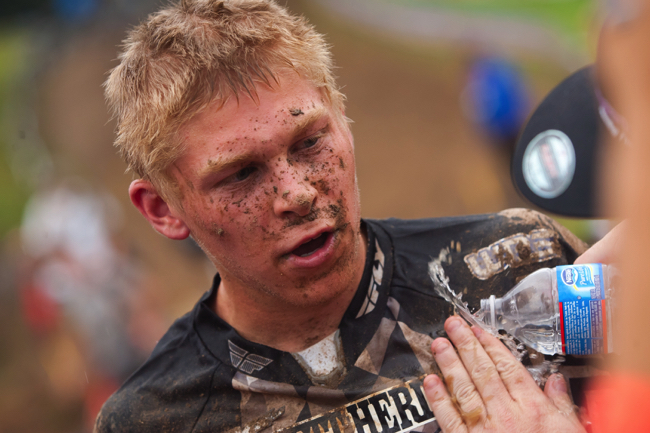 |
Alexander:That was Alex’s biggest problem—his environment. If he’s around good people and positive people, then he’s a good guy. I guess that’s the same way with Andrew [Short]. If Andrew was thrown into a situation like that, he would melt down.
Hartel:It’s definitely a good story. I definitely believed in both those guys just because they wanted to put the effort in. They were always into it. They never wanted to settle for anything. I knew that people would see what they had to offer. And, sure enough, they did. I was just thankful enough that Alex could take me along with him when he did move on.
Alexander:If you told me back then that Alex was going to do what he’s doing this year, honestly, I wouldn’t believe it. Alex has got the heart and tries harder than anyone I know. I always had hope that he would, and I always said to him that hey, you can do well or whatever, but I never would have thought he’d be winning a moto. I knew he could lead some laps maybe, but I thought he’d always just be that top-ten guy that was just there—just stable.
Martin:At that point in time, I kind of always thought I was just going to be, like, a top-ten is as good as it’s going to get for me.
Nicoletti:Honestly, I think about our success this year a lot. If someone that was at the top and had to go down to the bottom to where we were to get back to the top, and waste those three or four years to try and get back, there’s no way that they would go through the troubles and stress. The defeat was just miserable.
But then, at the same time, it’s hard because I believe it does build character when things do go wrong with teams now, or with JGR or with Cycle Trader, and it’s out of our control and out of the team’s control. I think he and I take it better than anybody else would. Just because anything that could possibly go wrong we’ve seen already. And that’s no bullshit.


